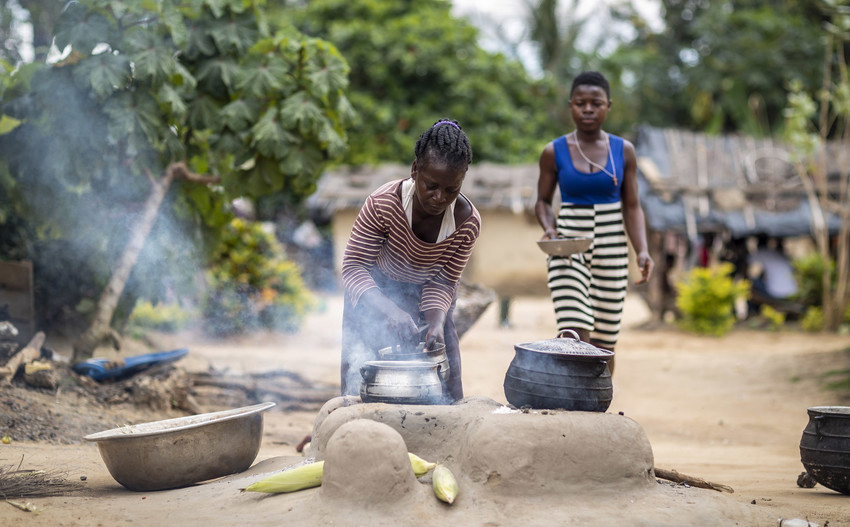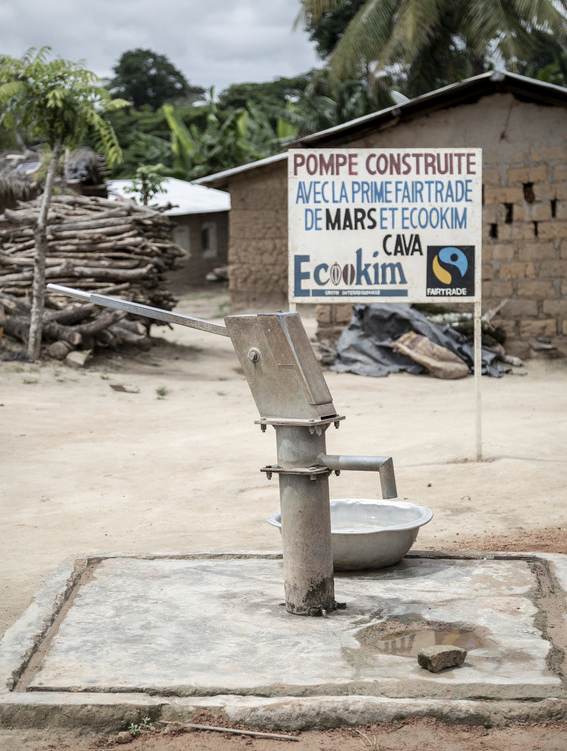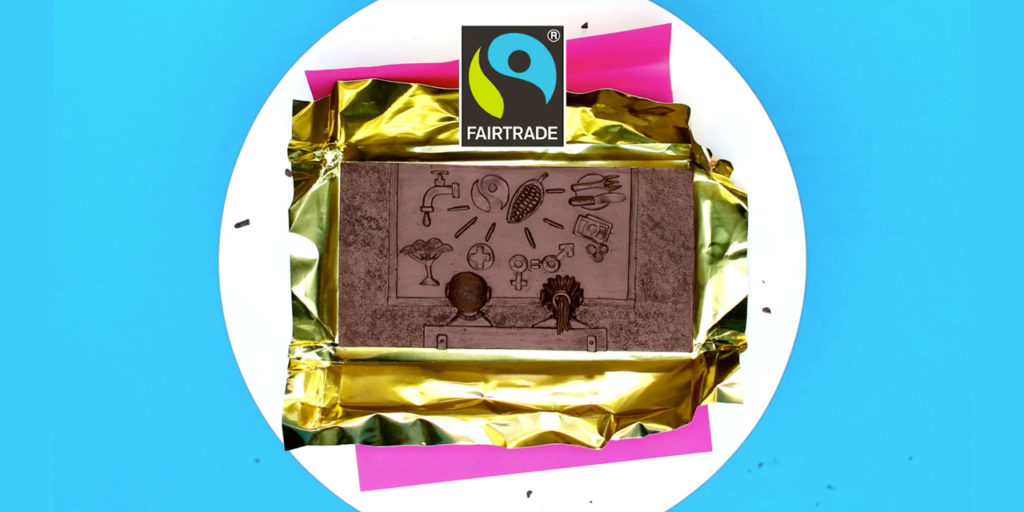We all love chocolate because it tastes nice and for most of us, once we start on a bar of chocolate we can’t stop until it’s all gone. That creamy viscosity when you take it out of its wrapper and put a piece in your mouth without biting, combined with the perfect ration of sugar and fat is mouthwateringly tantalising.
But like most things in life, if you look more closely at the wrapper, you can find out a lot more about the conditions under which the beans in your bar were produced. Because the unpalatable truth is that the chocolate industry is more bittersweet than you might think. And on 31st March, the government of Côte d’Ivoire announced it had reduced the guaranteed price paid to farmers by 25% compared to last year. Find out more about the price drop.
Around 60 percent of the world’s cocoa is produced by 2.5 million small farmers in Côte d’Ivoire and Ghana under very tough conditions, in a small belt within 10 degrees of the equator, where the weather is hot and wet enough for the beans to thrive. The production of this precious commodity rests all too often on inequality, injustice and exploitation.
Despite working gruelling days, the average cocoa farmer in the cocoa belt earns just $1 per day or less, well below the extreme poverty line of $1.90 per day, and even further behind the amount that equates to a living income at around $2.50 a day. On top of this cocoa farmers are exposed to the volatility of the global cocoa market.
1. Gender equity
An already unacceptable situation is even worse for a large number of women farmers – Fairtrade has calculated they earn five times less than their male counterparts. Fairtrade is supporting women to challenge the gender gap, enabling them to stake their claim and succeed on their own terms. Fairtrade Standards are designed to prevent gender inequality, increase female participation and empower more women and girls to access the benefits of Fairtrade.
When the terms of trade are stacked against farmers it drives poverty, social injustice and environmental degradation. Without action by all actors – consumers, businesses, the cocoa sector, governments – the systemic problems facing the cocoa sector will persist.
Therese belongs to CAVA co-operative in Côte d’Ivoire. She believes her children deserve more. So that’s her priority – doing everything she can to offer them better chances in life. In her words ‘to leave them higher’.

2. Education
Perhaps the single most important thing that happened to Therese – or didn’t happen – was that she didn’t go to school. ‘This was devastating to me.’ She knows the opportunities that education can offer, the choices it can open up. And it’s left her determined to do whatever she can to make sure her children have those chances. The oldest is at university in Côte d’Ivoire’s capital city, Abidjan. The others study in the biggest nearby town, which is still a bumpy two-hour drive away. They stay there, which means not only that she must pay for their fees and books, but that she must find a place for them to stay and pay for their food.
3. Decent incomes
As an Ivorian cocoa farmer and a woman at that, Therese is one of the fortunate ones. Both she and her husband own their own cocoa farms. She belongs to a group of farmers who have a market for their beans through Fairtrade. Most importantly, this means that she has a safety net in the form of a minimum price for her crop. This is vital, as prices for cocoa are some of the most volatile on the market and frequently plunge to levels that leave farmers like Therese hungry and out of pocket.
4. Food security
It’s this security that allows Therese and her husband to support eight children. She has to pay for their fees and books, as well as boarding and food. Most of her money goes on their education but there’s no question that the sacrifices she makes are worth it. ‘I am suffering at the moment for my kids to have a good job in cities so that they will not come back here and suffer again like me.’ She and her husband supplement their income with other crops, because the money from cocoa only comes in a couple of times a year and more often than not, doesn’t last that long. ‘At the moment life is very hard around here.’
As is so often case across the world, the responsibilities of cooking, washing and cleaning the house also fall to Therese. Collectively, the co-operative she belongs to earns extra money through Fairtrade, called the Fairtrade Premium. Together they decide what they should spend it on for the most benefit to their community.
5. Clean Water
For Therese, one of the biggest changes brought about by this is a community water pump. The village she lives in has seen an improvement in child health: ‘In the past the water we used to have to drink, even if people were asking you to do their washing in it, you would have refused because it [the water] was unclean, but we used to boil that water before drinking. Thanks to the co-op CAVA, today we can have clean water in our village to drink. In the past when we used to drink the dirty water from wells and rivers the children were getting sick all the time, but today, because of the water coming from the pump, children are feeling well, healthier, and everybody is happy about that.’

For Therese, the price she gets now for her cocoa is better than before. She illustrates how powerless the cocoa farmers are in the supply chain. They were at the mercy of whatever anyone would pay them: ‘Thanks to co-operative CAVA, we can say that CAVA is respecting the government’s price, but before the co-op we used to have here, private buyers, that were hiding to come and buy, who would not respect or enforce the price. Now CAVA is respecting the price and our revenues are increasing.’
6. Climate justice
It’s not all about the Fairtrade price and premium though. Therese is keen to highlight the other benefits of being part of Fairtrade. It’s the way the co-op is organised, and how it ensures health and safety and other rights at work are upheld. ‘When I am selling through CAVA co-op, the price is respected. In addition, the co-op is in charge of the treatment, they provide pesticides, they provide boots, they provide machetes, they even provide cash money to the farmers so that they can handle the farms, this is called the Premium and I really appreciate that.’
Therese’s story highlights the main seven benefits that Fairtrade brings to her community, namely education, income improvement, access to clean drinking water, nutritious diet, environmental protection and climate mitigation, healthcare and gender empowerment.
For the future of chocolate to be fair and sustainable, cocoa farmers need to earn enough to cover their basic needs. They need to earn living incomes, enough so farmers can have a decent standard of living, enough to cover all their cocoa farming costs and their basic human rights, such as a nutritious diet, children’s education and healthcare. Plus a little bit extra for the future.
We started campaigning for living incomes in 2017, calling for action across the chocolate sector. We then introduced our Fairtrade Living Income Reference Price and set out a comprehensive framework for companies to sign up to, bringing together tactics such as raising productivity, farm efficiency and empowerment of women leaders in farming communities as well as higher prices.
Fairtrade chocolate is undoubtedly a choice for change. When you choose Fairtrade you’re choosing fair pay and more power in the hands of cocoa farmers, to invest in their businesses, grow their incomes, and build better lives for their families and communities. Fairtrade means food, clean water, climate justice, medical care, education, gender equity and food security. Your choice signals to businesses and governments that you believe in a fairer future, where cocoa farmers can earn a living income. We all have a part to play to change the future of chocolate for the better.
Unwrap a brighter future for cocoa farmers by choosing Fairtrade this World Chocolate Day.
Find out where to buy Fairtrade chocolate
